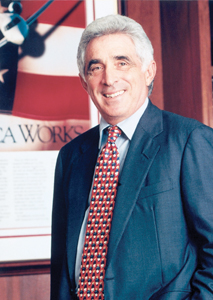Untitled Document
Ted Forstmann, a pioneer of the leveraged-buyout industry who turned around companies like Gulfstream Aerospace and Dr Pepper before acquiring and transforming the business of one of sports’ premier agencies, IMG, died today. He was 71.
The cause was brain cancer, an IMG spokesman said. Forstmann was diagnosed with the disease in May and shortly thereafter relinquished many of his day-to-day responsibilities at IMG to Chief Operating Officer Mike Dolan, who will continue to run IMG.
 |
Ted Forstmann
Photo by: IMG |
Forstmann made a name for himself over the last three decades by buying and selling companies. His firm, Forstmann Little, which he founded in 1978 with his brother, Nicholas, and Brian Little, made 31 acquisitions and returned more than $15 billion to investors.
He became a figure in the sports world in 2004 when he bought IMG for $750 million and began reshaping its business by shedding its famous professional sports agent operation and replacing it with a robust college sports business.
His focus on earnings spurred an abrupt cultural change at the company, led to the departure of an array of longtime executives and triggered public criticism that IMG had become less innovative. But he combated any turmoil and criticism by insisting that he’d turned IMG into a moneymaking enterprise with more than $110 million in profits in 2010.
"His vision was to turn it from an agency into a company that owned and promoted sports and entertainment assets," said Dave Checketts, a former IMG board member. "He had a great business mind and was very ambitious about growth and change and development. He wanted to make IMG his last hurrah."
Before buying IMG, Forstmann amassed enormous wealth by using debt to buy and later flip companies for a profit. One of his most successful investments was his $850 million purchase of Gulfstream Aerospace in 1989, which he later sold for a $2 billion profit. He had similar success flipping companies in health care (Community Health Systems), trading cards (Topps) and cable television equipment manufacturing (General Instrument).
“His approach was to look out over a long period of time and try to figure out the value,” said Tom Lister, a former partner at Forstmann Little. “He usually got that right.”
But his track record as an investor wasn’t perfect. In the late 1990s, he invested heavily in the telecommunications industry only to see the companies he put money into, XO Communications and McLeodUSA, file for bankruptcy. He lost more than $2 billion and was sued by the state of Connecticut, which lost $100 million of the state’s pension fund on Forstmann’s telecom investments.
Observers expected Forstmann to sell IMG for a profit in much the same way he had sold Gulfstream and Dr Pepper. But he always denied rumors that he wanted to sell the company and held onto it until the day he died.
During his ownership, IMG saw some of its biggest athlete agents leave to pursue other opportunities. The company initially looked to fill those vacancies but ultimately gave that business up because Forstmann believed it didn’t deliver enough of a profit.
Instead, he looked for other opportunities.
Some of those efforts failed. For example, he hired former HBO executive Chris Albrecht to create an entertainment division in 2007, but the effort never got off the ground and Albrecht left after less than a year.
But his biggest bet, a $300 million investment in college sports between 2007 and 2010, was an immediate benefit to the company’s bottom line. According to people who have seen the company’s books, the college business will be half of the company’s earnings this year, when EBITDA is set to hit $160 million. Those numbers could not be independently verified.
“Ted’s a builder,” said George Pyne, president of IMG Sports and Entertainment. “He wanted to build and grow and change paradigms, and the investment in college sports speaks to all of that.”
Throughout his career, Forstmann garnered public attention as an outspoken critic of the business practices employed in the same leverage-buyout industry he helped pioneer. He decried junk bonds, which many competitors used to finance acquisitions, as “funny money” and famously compared leveraged-buyout firms to the Visigoths by telling a corporate executive that the “barbarians were at the gate,” a phrase that ultimately became the title for a book chronicling the 1988 takeover battle for RJR Nabisco.
His criticisms cast him as an outsider on Wall Street. It was a role he embraced across many areas of his life, including politics and philanthropy.
While many in his professional circles supported the Democratic party and gave to institutions like the New York Public Library and Metropolitan Opera, Forstmann was a Republican Party donor who focused his giving on children by developing a Children’s Scholarship Fund, which underwrites the cost of sending underprivileged kids to the school of their choice. He joined Bill Gates, Warren Buffet and others in signing “the Giving Pledge,” a promise that he will give more than 50 percent of his wealth to charity.
Forstmann’s life extended far beyond the sports and business communities and into entertainment and popular culture. Actor David Rasche memorably portrayed him in the HBO film adaptation of “Barbarians at the Gate.” The lifelong bachelor also popped up in the gossip pages often, at times being linked romantically with stars like Elizabeth Hurley, Princess Diana and, most recently, Padma Lakshmi.
He never married but adopted two boys, Siya, 29, and Everest, 25, from South Africa more than 10 years ago.





